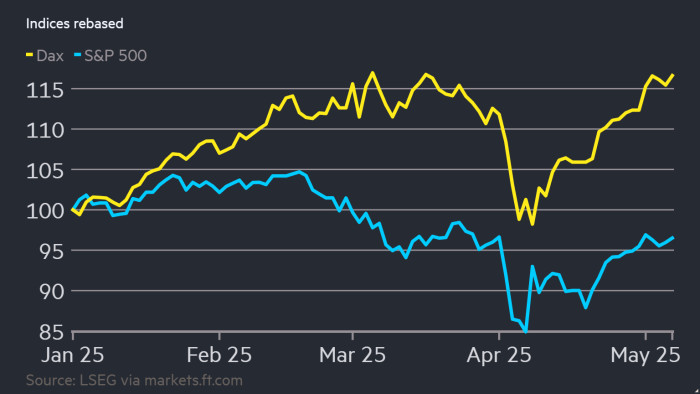Share this @internewscast.com
Unlock the Editor’s Digest for free
On Friday, Germany’s Dax index reached a record high, marking its position as the first major European benchmark to recover from the setbacks caused by Donald Trump’s tariff threats. This rise in the index reflects investor optimism about US trade deals, which have led to positive impacts on global markets.
In morning trading, the Dax went up by 0.6 per cent. This followed the announcement of a US-UK trade agreement on Thursday and a subsequent call between US President Trump and Germany’s new chancellor, Friedrich Merz. During the conversation, they both agreed on the importance of quickly resolving trade disputes. Meanwhile, the US and China have plans to meet this weekend with the aim of easing tensions in their ongoing tariff conflict.
Chancellor Merz, who previously stated that Europe should strive for “independence” from the US, adopted a more conciliatory approach with Trump. He acknowledged that Washington continues to be an “indispensable friend and partner.” The two leaders have also agreed to meet in the near future, according to a spokesperson for the German government.
The Dax’s return to all-time highs also reflects the wave of enthusiasm for German stocks sparked earlier this year by Merz’s plans to increase borrowing and inject hundreds of billions of euros into the country’s military and infrastructure.
Emmanuel Cau, head of European equity strategy at Barclays, said the trade news had given a broad boost to stock markets.
But he added: “There is an extra degree of excitement in Germany as part of this revival narrative and the arrival of the new government. There’s more and more interest in Germany.”
European stocks have outshone their Wall Street peers this year due to optimism over defence spending combined with growing fears over the impact of Trump’s trade war on the US economy.
The Dax is up nearly 18 per cent this year. Defence stocks have performed strongly following the spending commitments, with Rheinmetall up more than 170 per cent.
The German stock market has also benefited from a strong performance from European banks. Deutsche Bank shares have risen 43 per cent this year.
While US stocks have also recovered their losses since Trump’s “liberation day” tariff announcements in early April, the S&P 500 benchmark remains well below its February all-time high and is down nearly 4 per cent so far in 2025.
Europe’s outperformance of Wall Street this year has partially narrowed a large valuation gap between US and European equities that had widened in recent years due to a relentless rally in US tech stocks.
“Peak trade fear is behind us,” said Laura Cooper, global investment strategist at Nuveen. But she added that “bouts of choppy price action” should be expected as the disruption from tariffs washes through the global trading system.
But asset managers have also urged caution, given Trump’s strong rhetoric on tariffs and broader concerns about US policymaking.
“For now, this [rally] is holding,” said Kevin Thozet, a member of Carmignac’s investment committee. “But it is not evident that it will continue this way for a very long time. Peak Trumpism may be behind us but uncertainty is still there.”













